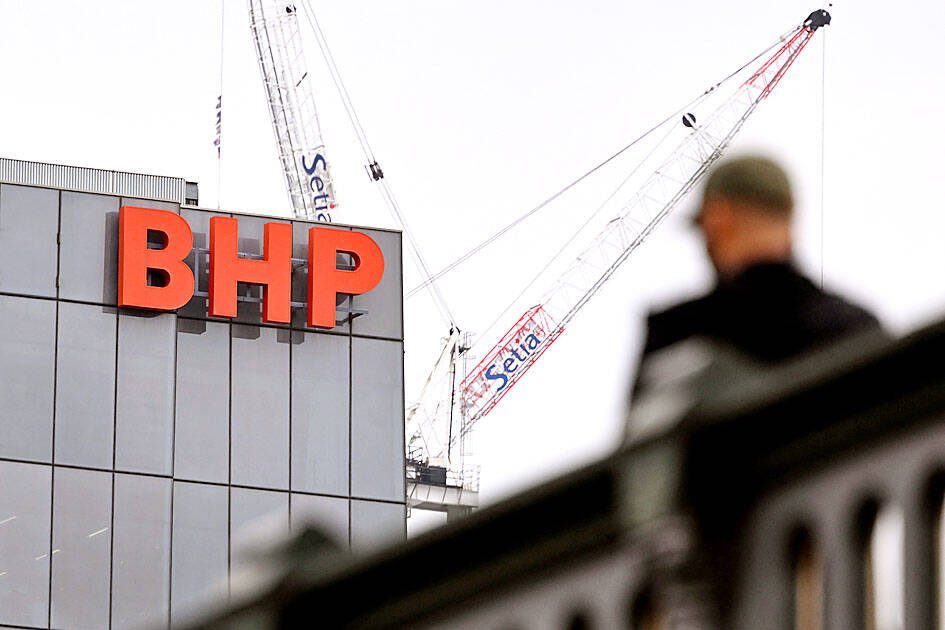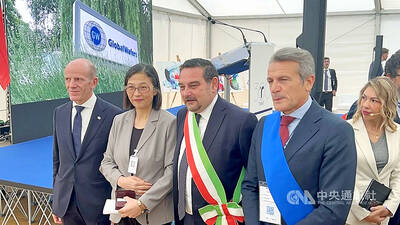Global mining group BHP Group Ltd yesterday said that it expects China and India to boost demand for its commodities in the year ahead after profits took a hit from lower iron ore and copper prices.
The Australian multinational, a leading producer of metallurgical coal, iron ore, nickel, copper and potash, said net profit slumped 32 percent year-on-year to US$6.46 billion in the six months to Dec. 31.
Sales slid 16 percent to US$25.7 billion in the same period, it said, citing a drop in prices for iron ore and copper, rising inflation, and a decision by the state of Queensland to raise royalties on coal to “the highest maximum rate in the world.”

Photo: AFP
BHP shares slumped as much as 2 percent in Sydney trading after the miner slashed its dividend following rising costs and weaker commodity prices, partly reflecting the chill caused by China’s now-softened “zero COVID-19” policy. The shares later recovered to end the day down 0.3 percent.
“In the near term, BHP’s operating environment is expected to remain volatile,” the Melbourne-based group said in a statement, as economies cooled under the influence of anti-inflationary measures.
However, China is expected to be a “source of stability” for commodity demand, it said.
Chief executive Mike Henry said he was “positive” about the demand outlook in the year ahead.
“We expect demand in China and India to provide stabilizing counterweights to the ongoing slowdown in global trade and in the economies of the US, Japan and Europe,” he said.
“The long-term outlook for our commodities remains strong given population growth, rising living standards and the metals intensity of the energy transition, including for steelmaking raw materials.”
Despite a global drive to cut carbon emissions, BHP said it expected higher-quality metallurgical coal to be used in steelmaking blast furnaces “for decades,” saying they would help to reduce the carbon intensity of furnaces when compared with lower-quality coals.
Additional reporting by staff writer

RECYCLE: Taiwan would aid manufacturers in refining rare earths from discarded appliances, which would fit the nation’s circular economy goals, minister Kung said Taiwan would work with the US and Japan on a proposed cooperation initiative in response to Beijing’s newly announced rare earth export curbs, Minister of Economic Affairs Kung Ming-hsin (龔明鑫) said yesterday. China last week announced new restrictions requiring companies to obtain export licenses if their products contain more than 0.1 percent of Chinese-origin rare earths by value. US Secretary of the Treasury Scott Bessent on Wednesday responded by saying that Beijing was “unreliable” in its rare earths exports, adding that the US would “neither be commanded, nor controlled” by China, several media outlets reported. Japanese Minister of Finance Katsunobu Kato yesterday also

‘DRAMATIC AND POSITIVE’: AI growth would be better than it previously forecast and would stay robust even if the Chinese market became inaccessible for customers, it said Taiwan Semiconductor Manufacturing Co (TSMC, 台積電) yesterday raised its full-year revenue growth outlook after posting record profit for last quarter, despite growing market concern about an artificial intelligence (AI) bubble. The company said it expects revenue to expand about 35 percent year-on-year, driven mainly by faster-than-expected demand for leading-edge chips for AI applications. The world’s biggest contract chipmaker in July projected that revenue this year would expand about 30 percent in US dollar terms. The company also slightly hiked its capital expenditure for this year to US$40 billion to US$42 billion, compared with US$38 billion to US$42 billion it set previously. “AI demand actually

Jensen Huang (黃仁勳), founder and CEO of US-based artificial intelligence chip designer Nvidia Corp and Taiwan Semiconductor Manufacturing Co (TSMC, 台積電) on Friday celebrated the first Nvidia Blackwell wafer produced on US soil. Huang visited TSMC’s advanced wafer fab in the US state of Arizona and joined the Taiwanese chipmaker’s executives to witness the efforts to “build the infrastructure that powers the world’s AI factories, right here in America,” Nvidia said in a statement. At the event, Huang joined Y.L. Wang (王英郎), vice president of operations at TSMC, in signing their names on the Blackwell wafer to

Taiwan-based GlobalWafers Co., the world’s third largest silicon wafer supplier, on Wednesday opened a 12-inch silicon wafer plant in Novara, northern Italy - the country’s most advanced silicon wafer facility to date. The new plant, coded “Fab300,” was launched by GlobalWafers’ Italian subsidiary MEMC Electronics Materials S.p.A at a ceremony attended by Taiwan’s representative to Italy Vincent Tsai (蔡允中), MEMC President Marco Sciamanna and Novara Mayor Alessandro Canelli. GlobalWafers Chairwoman Doris Hsu (徐秀蘭) said the investment marked a milestone in the company’s expansion in Europe, adding that the Novara plant will be powered entirely by renewable energy - a reflection of its